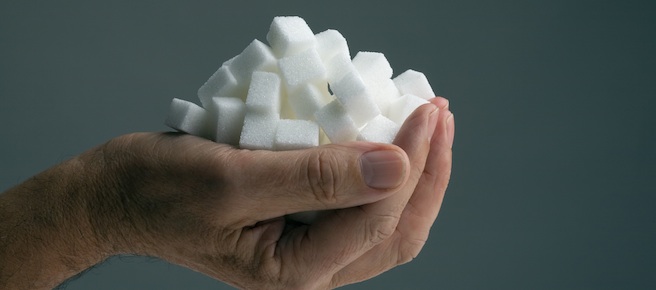Fat vs. sugar in battle of the bulge
Should we cut sugar from our diets the way we banished fat decades ago?
Handfull of sugar cubes
Share

In 1972, a British microbiologist-turned-physiologist named John Yudkin came out with the book Pure, White and Deadly. In it, he asserted that the diet wrecker to watch for was neither fat, nor wheat, nor salt—but sugar. The consumption of sucrose, he wrote, was linked with coronary heart disease and type 2 diabetes, and he wanted everyone to know, as the title of his book suggested, that sugar can kill.
But timing is everything, and Yudkin may have been a bit too early with the idea about sugar’s association with body weight. The fat hypothesis—or the view that consuming fat caused people to plump up—was the dominant diet theme of the day, according to the British Medical Journal, and the evidence behind Yudkin’s ideas wasn’t strong enough to fend off the messaging from the powerful sugar lobby. By the time the anti-sugar crusader died in 1995, his book was out of print, and his ideas, out of favour.
Now, the fat hypothesis is dead. There is strong evidence that total fat consumption has little impact on obesity. And after decades of opting for low-fat foods—”Can I get a skinny latte?”—sugar now seems to be the focus of our collective dietary ire.
You don’t need to look any further than the daily news for evidence of that swing. New York City is battling over a pop ban. One of the leading Yudkin acolytes, Dr. Robert Lustig, is coming out with a new book about the sugar hypothesis, titled Fat Chance. As Big Coffee appears poised to usurp Big Soda, Coca-Cola issued mea culpas about peddling sugary drinks and touted its low- and no-sugar options. Health commentators are even floating the suggestion that doctors should get in on the anti-sugar campaigning, and start probing patients about their sugar consumption, along with how often they smoke and drink.
With this trend toward vilifying sugar after decades of fat-bashing, Science-ish wondered what diet-conscious people are to do. Should we cut sugar the way we banished fat decades ago?
One of Canada’s leading obesity researchers, Dr. Arya Sharma, doesn’t think so. “When the focus was on reducing fat to control weight, that never worked because when you take fat out of products, to make them tasty, you had to add sugar,” explained Sharma. “So if you say the problem now is increased sugar, and we start going to no-added sugar, chances are, we’ll put the fat back in.” In other words, we’ll compensate for the calorie loss from reducing sugar by replacing it with some other source of calories.
Sharma goes by the simple adage “calories are calories are calories.” When overweight or obese patients visit his clinic, he first tries to identify where the bulk of their energy comes from. Then he works with them to find sustainable ways to cut those calories. “If most calories come from alcohol, and you reduce alcohol intake, you’ll get fewer calories. If most come from sugar, and you reduce sugar intake, that’s going to have an effect,” he said.
The reason for the re-emergence of sugar as a diet scourge is new research about its impact on weight. A new systematic review, published in the BMJ, looked at what happens when people alter their sugar intake, and found a weight fluctuation of about two pounds associated with eating more or less sugar. The review also highlighted strong evidence that drinking sugary beverages is linked with an increased risk of coronary heart disease, type 2 diabetes, and hypertension.
But again, this may be more about calories than the effects of sugar on weight. For example, with easily-drinkable sugary beverages, you might not realize how many calories you’re slurping compared with, say, chewing through a meaty steak. As one of the review authors, Dr. Jim Mann, told Science-ish, we still don’t have a good grasp on exactly how sugar impacts weight differently than other nutrients. “There certainly is a lot of publicity given to sugar at present, but it is not correct to say that any single factor is driving the obesity epidemic,” he said. “What is driving the epidemic is an excessive intake of calories over our requirements.”
The best-available research suggests other carbs may affect the size of our waistbands at least as much as desserts. “Poor quality carbohydrates are a clear risk factor for weight gain, metabolic dysfunction and diabetes,” Dr. Dariush Mozaffarian, a Harvard professor who focuses on dietary habits, told Science-ish. “This includes not only sugars, but also starches like potatoes and refined grains such as white bread and most cereals.” So even if watching one’s sugar intake for health is a no-brainer, singling out sweets at the public-health level doesn’t really make sense. As Science-ish concluded last year, regarding the suggestion of a sugar tax, we’d need to tax bagels in the same way we would tax candy if we want to be science-based.
In light of the new research about the effects of sugar on weight, Pure, White and Deadly is being reissued, 40 years after it was first published and nearly two decades after Yudkin’s death. But before we canonize Yudkin for holding the keys to the obesity epidemic, we should step softly down the sugar-free path. The science on sugar and obesity is still working itself out, and if the fat craze taught us anything, it should be a lesson in moderation. Here, Dr. Sharma is instructive: “The beauty of the human species is that we can get the stuff we need from almost any diet—unless you go to extremes or totally cut out certain foods. What ultimately matters is caloric restriction.”
Science-ish is a joint project of Maclean’s, the Medical Post and the McMaster Health Forum. Julia Belluz is the senior editor at the Medical Post. Got a tip? Seen something that’s Science-ish? Message her at [email protected] or on Twitter @juliaoftoronto